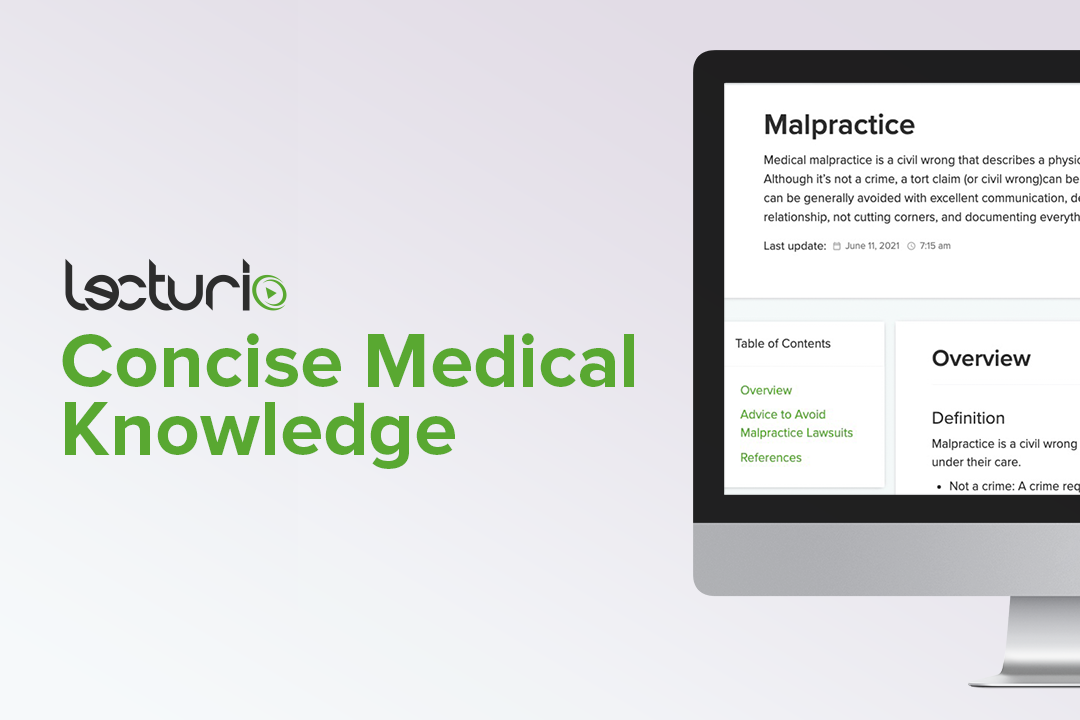Playlist
Show Playlist
Hide Playlist
Root Causes and Types of Medical Errors
-
Slides Root Causes and Types of Medical Errors.pdf
-
Download Lecture Overview
00:01 Now that we've looked at the background of some medical errors, let's take a look at some of the specific root causes and types of medical errors. 00:10 According to the Agency for Healthcare Research and Quality or the AHRQ, there have been identified 8 common root causes of medical errors. 00:19 Let's look at each of these in detail. 00:22 The first of these are communication problems. 00:24 We talked about this a little bit earlier. 00:26 Communication is considered to be the most common cause of medical errors. 00:30 And this is really kind of striking because this really comes down to how we convey information to others. 00:35 This can occur between a physician, between a nurse, between a healthcare team member, between a patient, it can be an individual communication issue, it can be a systematic communication issue. 00:49 The second is inadequate information flow, a closely related but separate concept. 00:54 This occurs when necessary information does not follow the patient when transferred either from one management team to another within a hospital from one hospital to another hospital. 01:06 This results in several problems. 01:08 The first is a lack of crucial information which is needed to influence health care decisions being passed along. 01:15 The second is the lack of an appropriate communication of test results, very crucial. 01:20 And then finally, a poor coordination of medication orders. 01:23 All of these happen when we don't have a good systematic and inter-individual flow of information. 01:31 The third, we'll call human problems. 01:33 This occurs when standards of care, policies, procedures, or processes are not followed properly or efficiently. 01:41 Some examples. 01:42 Poor documentation, this is a crucial one, as has been said many times to many trainees, "If you didn't document it, you didn't do it." Documenting what you did, and documenting it in clear, readable fashion is crucial to providing information flow. 01:58 Secondly, the poor labeling of specimens. 02:01 This is a mistake which happens all too frequently and is rather inexcusable. 02:05 We need to make sure that what we draw up what we send off is clearly labeled. 02:10 And then finally in this category, knowledge-based errors, inadequate knowledge to provide care needed. 02:17 Here's where things like communicating things in a continuing medical education fashion. 02:23 In services, courses are very crucial that we keep up with the latest developments and that our patients do not suffer for our lack of information. 02:33 The fourth category identified by the AHRQ was called Patient-related issues. 02:39 Some of these would include number one, inappropriate patient identification. 02:44 As we know patients wear wristbands, wristbands are checked when patients go from unit to unit, surgery timeouts are done. 02:51 Identification mistakes have been made in the past. 02:54 And this is something that can clearly be avoided. 02:57 The second is inadequate patient assessment, not doing, for example, a complete head to toe history and physical prior to a procedure. 03:05 Things get missed that would prevent procedures from happening that shouldn't proceed based on limitations. 03:11 So a clear and concise assessment of the patient is essential. 03:18 Failure to obtain informed consent. 03:20 This is one that has become a very big topic of discussion is no doubt familiar with you. 03:26 The documentation of informed consent is essential to patient autonomy, and to making sure that we have a clear information flow from the clinician to the patient, such that they understand what is going on, and also that we know that we're proceeding with legal appropriateness. 03:43 And then finally, within patient-related issues, insufficient patient education. 03:48 This is related to informed consent, but this extends beyond informed consent. 03:53 This is how we educate a patient about a condition they may have. 03:57 Breaking it down in terms of the patient's can understand in a different way perhaps that we may communicate to another physician or nurse. 04:04 A fifth common root cause of medical errors identified by the AHRQ is organizational transfer of knowledge. 04:12 This can be a function of several things. 04:14 It can be insufficient training, it can be insufficient education, it can be how we communicate these issues to others. 04:21 Transfer of knowledge falls under communication, and is key to preventing medical errors. 04:27 A sixth area identified our staffing patterns and workflow. 04:32 This has become especially important in the post COVID era where we have fewer staff to carry out tasks and those who are working may be stretched thinner. 04:41 When people are covering more patients, more information can be lost and more errors can be made. 04:48 The seventh theory identified was that of technical failures. 04:50 This is somewhat self-evident. 04:52 So examples, complications or failures with medical devices, implants, grafts or pieces of equipment. 04:59 Things do break and our ability make sure that everything is current with regard to its expiration date, that we've updated with our suppliers and that we have the appropriate equipment is very important to help prevent this type of error. 05:12 And then finally, the eighth category identified was inadequate policies. 05:17 This is failures in the process of care, for example, poor documentation, poor communication of test results, any sort of policies that deviate from what is appropriate can lead to medical errors which can become quite costly and even catastrophic. 05:35 When we talk about errors, I'd like to distinguish between errors of comission and errors of omission. 05:40 Errors of comission are when we frankly do something wrong. 05:44 For example, we order a medication for a patient with a documented allergy to that medication. 05:49 That is an error of comission. 05:51 This is something that we have done wrong. 05:53 This is to be contrasted with errors of omission. 05:57 An error of omission is a failure to do the right thing that leads to an undesirable outcome or a significant potential for such an outcome. 06:05 An example of an error of omission would be failing to prescribe a proven medication with a major benefit for an eligible patient. 06:14 Specifically, the failure to give low dose unfractionated heparin to prevent venous thromboembolism prophylaxis in a patient after hip replacement surgery. 06:24 A patient that is subject to this sort of error may develop a venous thromboembolism, a pulmonary embolism and catastrophic cardiovascular collapse.
About the Lecture
The lecture Root Causes and Types of Medical Errors by Michael Erdek, MD, MA is from the course Medical Errors.
Included Quiz Questions
Which of the following is a common root cause of medical errors?
- Inadequate communication among healthcare team members
- Overestimation of patient health literacy
- Lack of healthcare resources
- Patient nonadherence to treatment plans
- Inadequate preoperative assessment
Which of the following is NOT a common cause of medical errors?
- Poor patient performance status
- Communication problem
- Inadequate information flow
- Poor documentation
- Poor labeling of specimens
What is NOT an example of a patient-related issue that may lead to medical errors?
- Technical failure of a piece of equipment
- Inappropriate patient identification
- Inadequate patient assessment
- Failure to obtain informed consent
- Insufficient patient education
Customer reviews
5,0 of 5 stars
| 5 Stars |
|
5 |
| 4 Stars |
|
0 |
| 3 Stars |
|
0 |
| 2 Stars |
|
0 |
| 1 Star |
|
0 |




